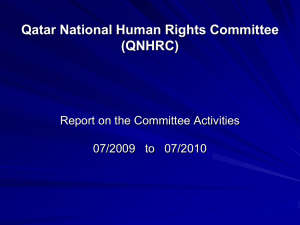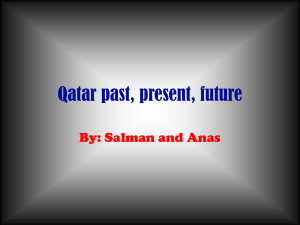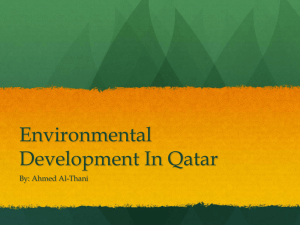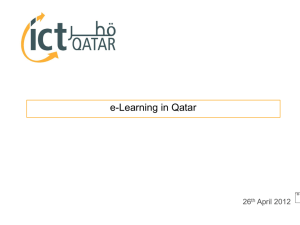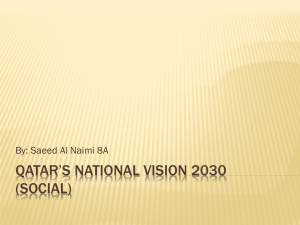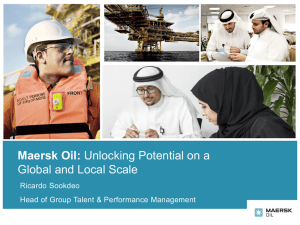Mahmoud-Abdulwahed
advertisement
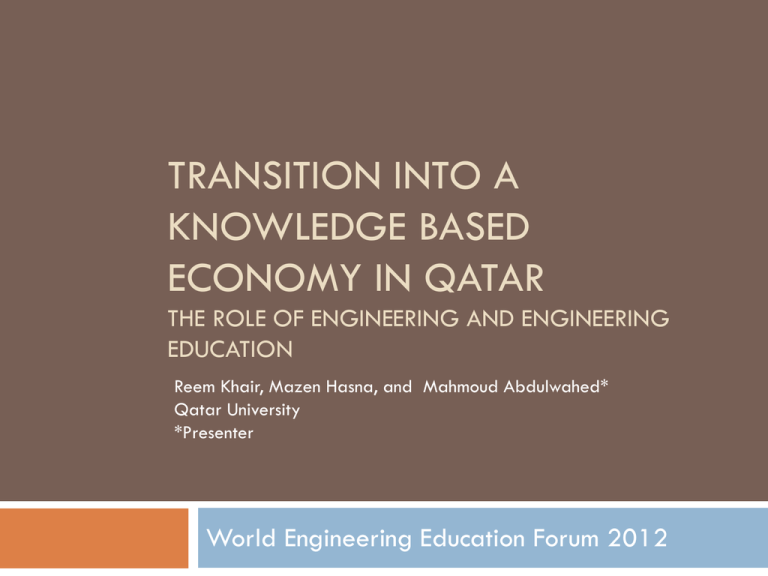
TRANSITION INTO A KNOWLEDGE BASED ECONOMY IN QATAR THE ROLE OF ENGINEERING AND ENGINEERING EDUCATION Reem Khair, Mazen Hasna, and Mahmoud Abdulwahed* Qatar University *Presenter World Engineering Education Forum 2012 Overview : Introduction KBE definitions Knowledge Based Economies The Role of Science, Engineering, and Technology in KBEs : The Case of Qatar’s Economy The Current Status of Qatar’s Economy Regional and International Comparison Transformation in Engineering and Engineering Education for a KBE in Qatar Initial Outcomes of Transformation in Engineering Education : Conclusion What is KBE “economies which are directly based on the production, distribution and use of knowledge and information” OECD, 1996 “Knowledge-Based Economy as an economy in which the production, distribution, and use of knowledge is the main driver of growth, wealth creation and employment across all industries” APEC, 2000 How to measure KBE Various international organizations provided an assessment framework for measuring KBEs readiness Common pillars among all frameworks can be categorized by: Business Environment ICT Infrastructure Human Resources Development Innovation Systems Transition to a KBE Many countries from different parts of the world have developed successful strategies for transforming to KBEs. Such as Denmark, Sweden, Finland, Netherlands, Norway, Singapore, United States and Canada. For all successful experiences which vary upon countries nature and prosperity, the key transition driver remains one for all The Role of Science, Engineering, and Technology in KBEs Knowledge Based Iundustries have critical role in building KBE. Both services and manufacturing industries are considered as KBIs Such as communication/port services, finance services, business services, education, healthcare, manufacturing of refined petroleum products, manufacturing of chemicals and chemicals products, manufacturing of machinery and equipment, manufacturing of electrical machinery and apparatus, manufacturing of electronic products and components and manufacturing of transport equipment. (Singapore Standard Industrial Classification (SSIC) Based on OECD Science, Technology and Industry Outlook 2000) The Case of Qatar Qatar vision 2030 rests on four interrelated pillars: Economic Pillar Qatar aims to leverage its economic status by converting its hydrocarbon-driven economy into a diversified economy that constitutes for knowledge, and high value industrial and service activities. This transformation process is viewed to be done through the use of wealth generated from the available natural assets to widen investments in its infrastructure; improve its public services; develop a competitive workforce; and support both innovative and entrepreneurial initiatives. Current Status of Qatar’s Economy is considered the heart of Qatar’s economy. Qatar is trying to diversify its resources and capabilities in multiple directions to enable the creation and inclusion of sources of wealth. Latest 2022. strategic initiatives is hosting FIFA World Cup International Comparison At global level, the current status of Qatar in terms of KEI Rank, which is a relative global measure, stands at 54th place with KEI equals to 5.84. Qatar is preceded by all of the Gulf Cooperation Council (GCC) countries except for Kuwait. For the education index, Qatar ranks 101 worldwide. This fact highlights the in Qatar as a mean to . Top Ten Countries Country KEI Rank Sweden 1 Finland 2 Denmark 3 Netherlands 4 Norway 5 New Zealand 6 Canada 7 Germany 8 Australia 9 Switzerland 10 KEI 9.43 9.33 9.16 9.11 9.11 8.97 8.92 8.9 8.88 8.87 Source: KAM 2012 report , World Bank Institute Education for a KBE in Qatar With no doubt, education is viewed as a vital engine for the production of KBE’s skills and competencies. a key source for the generation of both derivative and breakthrough ideas. In particular, science, engineering and technology fields are viewed as the areas of focus due to their inclusive nature. Specialized knowledge in areas such as chemistry, biology, finance, communication, networking, engineering, and information technology can be employed in and can help in Undergraduate Programs Civil Chemical Electrical Mechanical Industrial and Systems Computer Computer Science Architecture All ABET Accredited till 2016 Strategic Initiatives At the college level: Significant expanding in R&D activities in research priority areas as key contributors to a KBE Deployment of new constructivist teaching and learning methods Such as Research Based Learning (RBL) as an extracurriculum activity and Project Based Learning (PBL) Engineering outreach activities for high schools to match the increased demand on engineers. Such as the Life is Engineering Program (LIEP) starting from 2009 and the Computing Competition starting from 2011. Graduate Programs Master of Master of Master of Master of Master of Master of Master of Science in Computing Urban Planning and Design Science in Engineering Management Science in Environmental Engineering Science in Electrical Engineering. Science in Civil Engineering. Science in Mechanical Engineering. PhD in 12 Disciplines, FIRST IN QATAR! Affiliated with UCL. Life is Engineering Program to attract Qataris to engineering. Focus on male students in high schools. Students compete to build cars and race in Lusail circuit. Has been running for three years. Funded by leading industries. Industrial Partnership New Research Centers The Kindi Research Laboratories The KINDI Lab has the following three research themes; Information Intelligence; Distributed and Network Systems Smart Design. Qatar Road Safety Studies Center (QRS2C) The mission of the center is to create and disseminate knowledge related to road safety and accidents prevention by conducting studies, research and analysis and evaluation of road accidents in order to identify the root causes of accidents and critical factors that have a major effect on accidents reduction. The center has the following research themes; Road Engineering and Environment Road User Behavioral Change Vehicle Safety and Biomechanics Initial Outcomes of Transition: Research Research fund worth over QR 365,000,000 65 % of the faculty members are Research Active Home to over 65% of the total research fund at QU Our faculty produced over 1,600 papers Contribute to over 50% of all QU publications. Contribute to over 50% of all Qatar indexed publications in RE We contribute to about 70 % of total publications in MSE in Qatar Collaboration with over 70 Universities worldwide CENG faculty members won all QU Research Awards Initial Outcomes of Transition: Students The first and second places in the “GCC Engineering Students Design Competition 2012”. The second place in "The poster competition" in The 3rd International Gas Processing Symposium that was organized by GPC at Qatar University from 5 to 7 March 2012. The first Place in “The Microsoft Imagine Cup Competition 2012”. The first place in the “Student Poster Contest in IEEE PES T&D Conference and Expo 2012 Orlando, FL, USA “ May,2012. Leading places in the Shell Eco-Marathon event in Malaysia 2012. Initial Outcomes of Transition: Students The best research paper and presentation in the “Energy Category” in Qatar Foundation Annual Research Forum 2011. The third place in RasGas Star Competition 2011, first place in 2012. The Computing award during Qatar Foundation Annual Research Forum 2011. The first place in the Shell Case Study Competition 2011 & 2012. The first place in “The Fifth Engineering Student Gathering” that took place at Sultan Qaboos University from 1-3 April,2012 Future Plans Qatari Engineer for 2030 QU CubeSat International Journal for Undergraduate Research CENG Consultation Center Engineering Week. Book on Engineering and Engineering Education in the Middle East. Conclusion Engineering and technology are the core of achieving a KBE. the current status of Qatar’s economy is heavily relying on oil and gas. International benchmarking exercises have shown that KBI index in Qatar is significantly low in international standards, in particular when it comes to education. Conclusion In response to this, the College of Engineering at Qatar University has responded in various ways. R&D activities have been the focus of the college strategic plan over the past few years; research was integrated with undergraduate education mainly through the UREP program. A number of MSc and PhD programs in different areas of engineering and computing have been established. Outreach activities on K-12 level were developed and successfully deployed. Very recently, new proposal on establishing an engineering education center was submitted for necessary approvals. Engineering curriculum at CENG will undergo a comprehensive review during the next three years.
